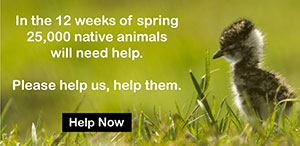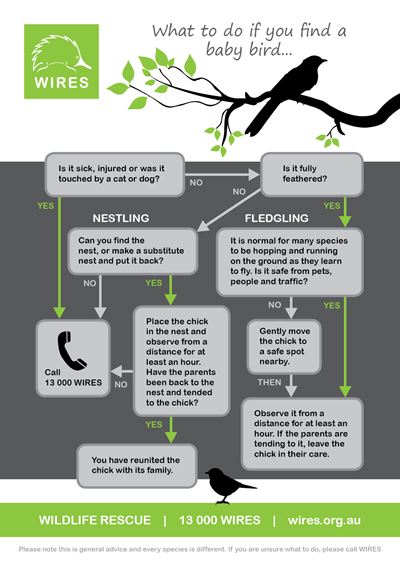Blog
Contact media@wires.org.au for enquiries or call 0416 272 153.
For the latest updates on bushfire recovery projects and emergency response
Read WIRES Emergency Recovery Plan and WIRES National Emergency Response Plan
Spring will bring 25,000 calls for help
In the past financial year WIRES received a record number of calls for rescue advice and assistance, over 77,600 calls in 12 months! In the next 3 months 25,000 animals are expected to need help. We can assist them, with your support Leanne Taylor, CEO of WIRES, reports a rise in calls for rescue advice and assistance over recent years. In the last 12 months WIRES recorded over 10% more requests for help than the year before.
 The majority of our rescue calls take place in the spring and summer seasons.
The majority of our rescue calls take place in the spring and summer seasons.
Not surprisingly, of the varying landscapes our birdlife inhabit, each species has very individual needs and requirements in order to survive. Our work at WIRES is to provide appropriate rescue, care and assistance to ensure these requirements are met.
As valuable habitat for native wildlife decreases, more and more of our native birds and other native wildlife are living in urban areas, which is often less than ideal for the native animals concerned.
As it has become increasingly likely that you will encounter sick, injured and orphaned birds and other wildlife, it is essential that WIRES are here to provide education and information to the community on how to help when you do. Immediate intervention can greatly improve the chances of survival for injured animals.
All species of birds are different and some, such as masked lapwings (commonly known as plovers) and some species of ducks lay their eggs to hatch on the ground and their chicks, stay on the ground until they’ve learnt to fly.
Other species nest off the ground and the young will flap their wings in the nest to build up flight muscles as they are growing and will then fly directly from the nest. A decline in habitat due to land clearing can mean that young chicks need to fly longer distances when they leave the nest and at times can end up on the ground if they are unable to make the distance. Adverse weather conditions can also lead to chicks being found on the ground before they are ready to fly.
Would you know what to do if you saw a baby bird out of the nest?
 If
the chick is feathered and uninjured, the parents are attending to feed
it and it is in no immediate danger from threats such as pets or
traffic, it is best to leave the chick with its parents.
If
the chick is feathered and uninjured, the parents are attending to feed
it and it is in no immediate danger from threats such as pets or
traffic, it is best to leave the chick with its parents.
However if a chick has little or no feathers, has its eyes closed, is laying down, appears clearly sick or injured or has been abandoned by its parents for an extended time then rescue assistance is required.
If you are ever in doubt of what to do when you come across a baby bird, please call WIRES 1300 094 737. If it’s clearly sick or injured it needs to see a vet urgently before coming into care and if it’s healthy, please ensure it is safe from any immediate danger and contact WIRES for further advice.
As the need to assist more animals continues to increase, we also require increasing financial support. Your support and ongoing involvement is vital to help maintain the incredible diversity of our bird species and to protect all wildlife, working to ensure the best outcomes for babies, juveniles and adults 365 days a year.
We will be working particularly hard to protect a new generation of wildlife this spring and we cannot do it without assistance. Please if you can, give today.
Search
Newsletter
Stay in touch and get our regular rescue stories, WIRES updates and a free copy of our 15 Ways to Help Wildlife ebook
Recent Posts
- Emergency Response Training for Wildlife Volunteers
- WIRES Introduces New Wildlife Rehabilitation Governance Courses in Collaboration with NPWS
- Community Support for Post-Bushfire Recovery of Wildlife in the Greater Blue Mountains
- Research Grants Program-2023 Recipients Announced
- National Koala Conference
- Nature Conservation Council's Bushfire Conference
- Support Stronger Nature Laws
- Helping Endangered Cockatoos: WIRES Grant Success Story
- Landmark Conservation Project Ensures The Future of The Northern Bettong
- Wildlife Road Collisions Unveiled
